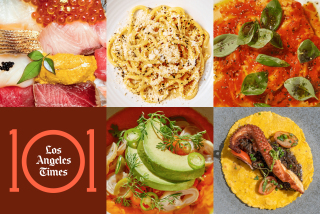Wanted: one cave manager
FIVE years ago, it would be safe to say, not a soul in California woke up each morning to a to-do list starting with: Review a restaurant for Michelin. For the foreseeable future, though, six people will be doing exactly that, producing the first L.A. version of the guide.
Michelin inspector is just the latest new job description in the nation’s rapidly expanding food universe, right behind beer sommelier, cheese affineur, mixologist and culinary philanthropist.
Careers are evolving that were unknown a decade ago, or at least before the Food Network brought out the inner Emeril in so many Americans and food became not just sustenance but entertainment, politics, culture, artisanal opportunity and national obsession. Other industries may face downsizing, but the business of eating and drinking has never seemed more vibrant. Dinner cannot be outsourced to India.
Jobs are opening up with farmers markets, in culinary tourism, in television, with Slow Food-style advocacy groups and especially with anything involving artisanal food and restaurant drinks. Consider the specialty Christina Perozzi has carved out for herself. She calls herself a beer sommelier, doing for microbrews what a traditional sommelier does for Super Tuscans. She says she “geeked out” on beer while working at Father’s Office in Santa Monica, a bar known for its extensive selection of beer, and now her “biggest passion is teaching people how beer pairs with food.” And so she helps restaurants and bars develop beer lists and train their staffs, organizes pairings with chefs at public events and teaches beer classes.
Perozzi has a blog (christinaperozzi.com), is writing a book (“Beer 4 Chx”) and says she would also like to branch out into beer tours, any one of which would have been job enough at one point in time.
Sommeliers galore
BEER sommelier is a natural, given that the first tea sommelier popped up less than a decade ago; now it is not unusual to hear the job envelope being pushed as far as salt sommelier and water sommelier.
Affineur -- refiner -- is another position with a French name and origin that is sounding very American as cheese becomes a national obsession. It refers to the person who improves the flavor of a cheese through aging for a few months or enhancing by some method such as washing in brandy. As director of affinage at the Artisanal Cheese Center in New York City, which sells cheese and gives classes on how to appreciate it, Alex Garcia chooses which types to import and to buy from American farmsteads, then decides how to handle them. Affinage, he says, “is 50% art and 50% technique.”
At any one time, the refrigerated “caves” at the center hold 160 to 180 different kinds of cheese, some destined to be sold right away and many more in the affinage line. Garcia set out to be an artist and was seduced by “the handmade and artistic aspect of cheese” while working at Artisanal Fromagerie and Bistro, which is also owned by his boss at the center, Terrance Brennan. Garcia now oversees a cave manager and a couple of interns who do the tasks such as turning cheeses as they age.
Other new culinary jobs have evolved from traditional ones. Karen Beverlin of Fresh Point, a California produce distributor, used to be a buyer who dealt only with wholesalers. Now she spends every Wednesday at the Santa Monica Farmers Market, hand-picking the best beets and lettuces and peaches to truck to restaurants nationwide.
“My role has morphed into more of a forager,” she says, “someone who gets out to look for something exceptional.” Her title changed, from general manager to vice president for special sales, as her duties did. “I have no administrative chores anymore,” she says. “I’ve eliminated all the nonfood, nonfun parts.”
If Thomas Keller at the French Laundry in Napa and Per Se in Manhattan wants perfect carrots, Beverlin will go vendor to vendor to taste every possibility. While many Los Angeles-area restaurants send staff to the market to shop, she said, “I want chefs in Orlando to have access.”
Then there is Jing Tio, owner of Le Sanctuaire, a “culinary boutique” in Santa Monica and San Francisco, who spends most of his time out-of-state peddling exotic spices to chefs looking for the next hot flavor. He and his sister Fanny also give seminars to other chefs on how to use the right equipment with hydrocolloids such as xanthan gum, the thickeners of choice for discerning cooks who have outgrown gelatin.
The Internet has created scores of food jobs, and not just for bloggers who earn income from advertising. It would be hard to imagine a business such as Heritage Foods USA, to take one example, employing directors, a staff and contract farmers raising rare-breed hogs and turkeys if online shopping did not provide it with a national customer base.
Culinary activism is another whole new field, and Ann Cooper of Moss Beach, Calif., has built a national reputation as the “renegade lunch lady,” appalled at the obesity epidemic and determined to change the way America’s schoolchildren eat. In the last 17 months, she says she has completely transformed the food in the cafeterias of the Berkeley public school system, from “100% processed” to a kid-enticing mix of seasonal and organic, with an emphasis on whole grains and salads.
Cooper was a white-tablecloth chef for years, wrote books, learned about sustainable food and made a name for herself as executive chef at the Putney Inn in Vermont. In 1999 she was hired to revamp the food program at the Ross School in East Hampton, N.Y., and that led to the job in Berkeley, with help from the Chez Panisse Foundation.
“I run it all, 90 employees in 17 locations, doing all the food in all the cafeterias,” Cooper says. “I also oversee all the cooking and gardening classes.”
She didn’t even have a stove in the central kitchen when she started, she says, but she now has four trained chefs working for her and is getting an increasing number of requests for externships from cooking schools. The job appeals to chefs who want “to do something different and make a difference,” she said. Cooper has been a consultant to other school systems, expanding opportunities for chefs who want regular hours and nights and weekends off.
Cooper points out that some supermarkets have had professional chefs on staff for at least the last 10 years, but trained culinarians in schools is a new concept.
Irena Chalmers, who teaches food writing at the Culinary Institute of America in Hyde Park, N.Y., is collecting job descriptions like that for a forthcoming book. Hers, of course, is a good example -- she also teaches a required course on “food in the news” to aspiring chefs and is starting a class on gastronomy next month.
Among the positions she has documented are wedding cake designers who can charge hundreds of thousands for their sugary handiwork, boutique farmers who grow crops to order for restaurants and culinary historians who hire out as consultants on movies “because you can’t have a Jane Austen character eating a cheeseburger.”
Chalmers says most of her students at the nation’s premier cooking school “don’t want to go into restaurants after spending all that money” and are increasingly open to jobs “with a better quality of life” -- meaning anything that does not involve “days being shouted at by mean chefs.”
Post-grads’ new paths
NO wonder culinary schools are scattering graduates into many other places young chefs never used to tread. Rebecca Marrs of the California School of Culinary Arts in Pasadena says that “boutique event planning” is a growing business for graduates, but some go on to work as demonstration chefs for companies such as Sur La Table and as mixologists, and “a lot of students are starting their own businesses making meals that are easy to heat up.”
“Meals ready to cook,” with the ingredients all prepped for dinners that can be delivered or picked up by short-cutting home cooks, are also providing opportunities for more and more graduates of the French Culinary Institute in New York City, according to Erik Murnighan, director of career services.
And Murnighan says there are also more jobs in culinary tourism (such as leading trips organized by Viking Range company) and he knows of at least one restaurant group that employs a “director of culinary philanthropy” just to handle requests for donations of food or money.
Another graduate recently started combining philanthropy and culinary tourism by forming an organization called CulinaryCorps, which takes chefs to New Orleans to donate time cooking at relief centers (and inject money into the local economy).
As celebrity chefs build restaurant empires, other jobs have been created: Thomas Keller, for instance, employs a human resources director who trained as a chef, Murnighan says. Chefs with just one restaurant typically handle the hiring themselves.
These days, the most prominent chefs often have staff to rival a small country’s. Ten or 15 years ago, it was possible for a food writer to reach almost any chef directly by calling the kitchen around 3 in the afternoon, after lunch service and before dinner; today it usually takes a call to a main office and burrowing through layers of bureaucracy just to reach the authorized spokesperson, rarely the chef.
Which partially explains what Anthony Hoy Fong does for a living. His title is culinary director for Tyler Florence, a Food Network chef now based outside San Francisco who produces cookbooks and is in constant demand for promotional appearances around the country. Unlike most celebrity chefs, Florence has no restaurants with cooks who can prep and plan for him.
Hoy Fong describes his job as half cooking, half managerial and shopping. He works on recipes, buys ingredients, preps them and even gauges the audience at tapings or events for Florence so that “when he shows, everything is ready and he can just walk onstage and he’s good to go.”
“Whether it’s in a restaurant or in the media,” Hoy Fong said, “you need a sous chef.”
Coming soon: media sommelier.
More to Read
Eat your way across L.A.
Get our weekly Tasting Notes newsletter for reviews, news and more.
You may occasionally receive promotional content from the Los Angeles Times.






